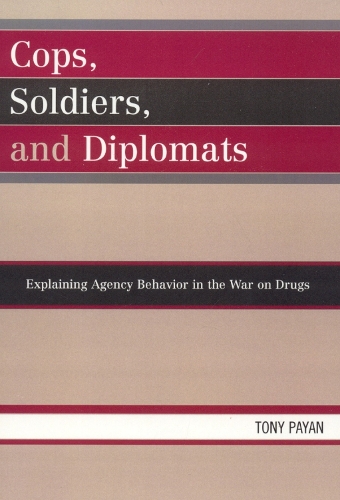
Cops, Soldiers, and Diplomats: Explaining Agency Behavior in the War on Drugs
(Paperback)
Publishing Details
Cops, Soldiers, and Diplomats: Explaining Agency Behavior in the War on Drugs
By (Author) Tony Payan
Bloomsbury Publishing PLC
Lexington Books
26th January 2007
United States
Classifications
Tertiary Education
Non Fiction
Police and security services
363.45
Physical Properties
Paperback
220
Width 153mm, Height 227mm, Spine 18mm
340g
Description
Cops, Soldiers, and Diplomats is an exceptionally clear exposition of bureaucratic behavior amongst various agencies as each responded to the challenges of the War on Drugs. Chapter by chapter, author Tony Payan exposes the bureaucratic imperatives of the numerous agencies waging the drug war, uncovering some of the fundamental structural reasons why this war could not succeed within the United States: fragmentation, competition, duplication, jealousy, turf-wars, information hiding, and ultimate failure. Payan's work will be certain to find an audience with politicians and policy makers, students of sociology and criminology, and any one interested in the drug war.
Reviews
Scholars tend to talk a great deal more about bureaucratic politics than they investigate the implications of this model for policy outcomes in particular policy areas. Tony Payan has done an excellent job of elaborating the model of bureaucratic politics and then applying it to the War on Drugs in the United States. The manuscript is thoroughly researched and is an important contribution to the literature on policy making and bureaucracy. I recommend it to every scholar, and every practitioner, concerned with how government actually functions. -- Guy Peters, University of Pittsburgh
The administration of George Herbert Walker Bush appeared to address seriously the drug problem. To the contrary, Tony Payan's closely argued, insightful book demonstrates why drug policy has remained on the periphery of American politics, never reaching the level of vital importance. -- William O. Walker III, University of Toronto
This is a well-researched book that helps us understand the bureaucratic incentives and organizational cultures that underly the legendary inter-agency clashes in U.S. drug interdiction efforts. The story that emerges is relevant to many programs that cobble together disparate organizations with varying missions and incentives, including not just the from the war on drugs but the Homeland Security Department, the Environmental Protection Agency, and the military occupation of Iraq. Anyone interested in understanding the politics of these complex inter-agency and inter-organizational efforts should read this book. -- Andrew Bennett, Georgetown University
Author Bio
Dr. Tony Payan is an Assistant Professor of Political Science and International Relations at the University of Texas at El Paso.
